Deciding on your next survey’s goal gives you a starting point as to what kind of questions you will use on your survey. And if you want to do concrete market research, give a data summary to your supervisors, or make informed decisions based on the data you collect, you should use quantitative survey questions.
In this article, we have gathered more than 100 survey question examples about gender, marketing, stress, psychology, academic performance, social media, and mental health to get you started. You can add these questions to your next research survey, or you can use them to get inspiration to write many more. Let us get started!
What is a quantitative research question?
The quantitative research question is a type of question where the person asking the question wants to obtain a numeric answer that will provide them with a tangible answer. It involves collecting objective, measurable data about a particular subject or topic, often through surveys, experiments, or other structured methods.

The definition of a quantitative research question
The data collected is typically numerical in nature, such as ratings, counts, measurements, or percentages. So, an answer to this type of question can be confidentially used when creating a quantitative analysis.
Quantitative vs. qualitative research questions
The main difference between quantitative and qualitative questions is what you want to achieve from the question and methods of data collection. Qualitative research focuses on exploring and understanding complex phenomena, experiences, and perspectives. And qualitative research questions aim to gather detailed descriptions and subjective experiences to gain insights.
On the other hand, quantitative research aims to answer questions that involve measuring and quantifying variables, examining relationships, and making statistical deductions. It mainly relies on structured data collection methods, such as surveys, experiments, observations, and existing datasets, in order to collect numerical data.
How to write a quantitative research question
If you want to obtain concrete data on a research topic, you should use quantitative research questions. They give you numerical answers such as ratings, measurements, counts, or percentages. That makes it easier to conclude a quantitative analysis. Therefore, use questions that will give you answers like; “three times a week”, “about 11”, “20% of the students”, etc. Here are some question starters to have in mind to give you quantitative research questions ideas:
- How many?
- How frequently?
- How often?
- How much?
- What percentage?
- To what extent?
- What is?
- What are?
- What proportion?
- On a scale of…
Here are some simple examples:
- How often do you go to the gym in a week?
- How much do you spend on groceries?
- How many phone calls do you make a day?
Types of quantitative questions
When you try to get numerical answers, the only option is not the multiple-choice one. You can use different types of quantitative research questions to make the form more interesting, visually appealing, and detailed if you use a smart survey creator, such as forms.app, you can make use of its multiple smart form fields to build your form. Let us see what are some good options to use on your next survey.
Star rating:
It is a good way to ask people their opinions, and the survey takers can rate criteria based on different categories. Each star represents an equivalent numeric value, and they typically range from 1 to 5. Even if they are clicking on stars, you get numeric data in the end.

A star rating question example
Opinion scale:
It is basically the same thing with the stars but instead, the survey takers rate criteria as numbers from 1-5 or 1-10. It is better to keep in mind the best way for this is using a 1-5 scale, with 5 being the best and 1 being the worst rating.
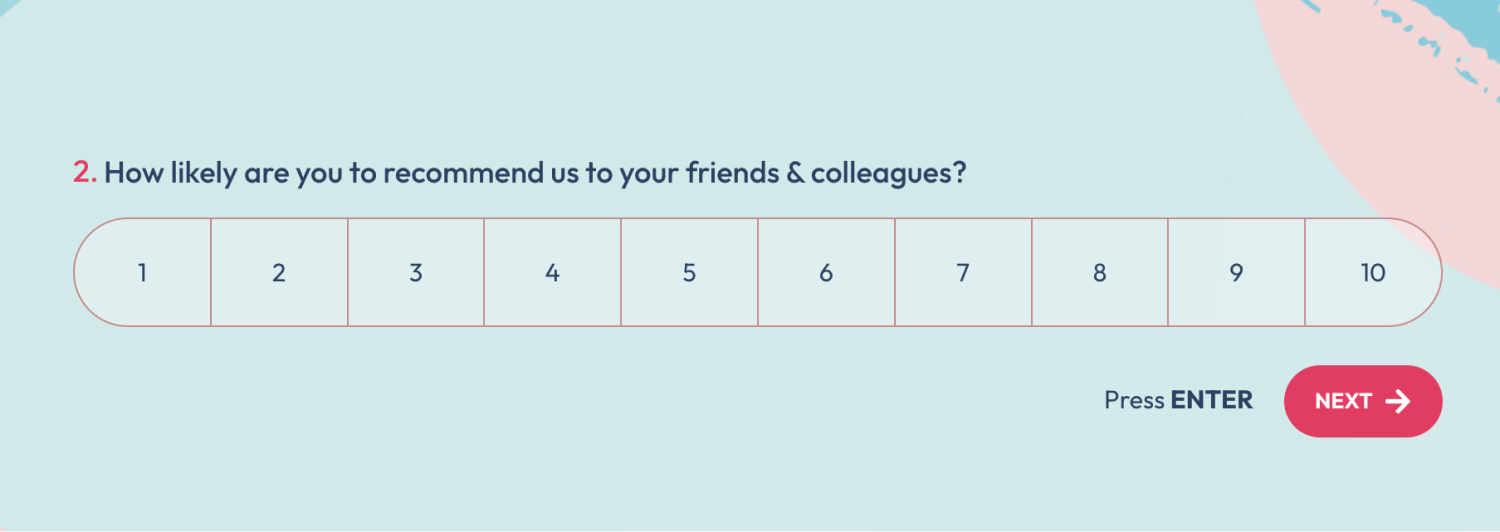
An opinion scale question example
Picture selection:
Having people choose their opinions in a picture selection form is a good way to go. It is a good option to use when you are creating a survey for market research and such.
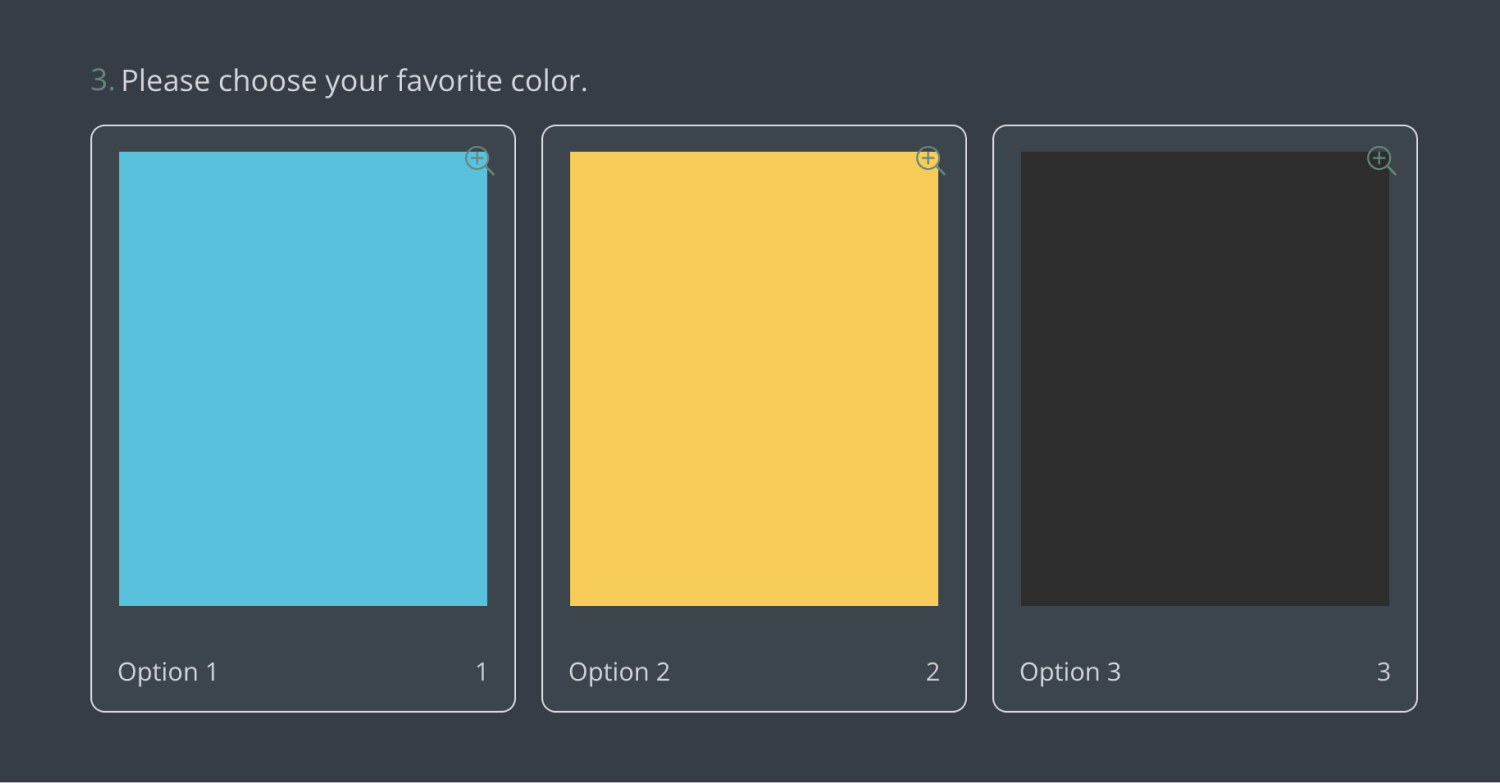
A picture selection question example
Multiple-choice:
When you ask people a question such as; “what are the reasons that negatively affect your mental health?” it is better to let them choose multiple reasons rather than a single one. You would not want to limit the target audience by making them choose only one thing on the list.
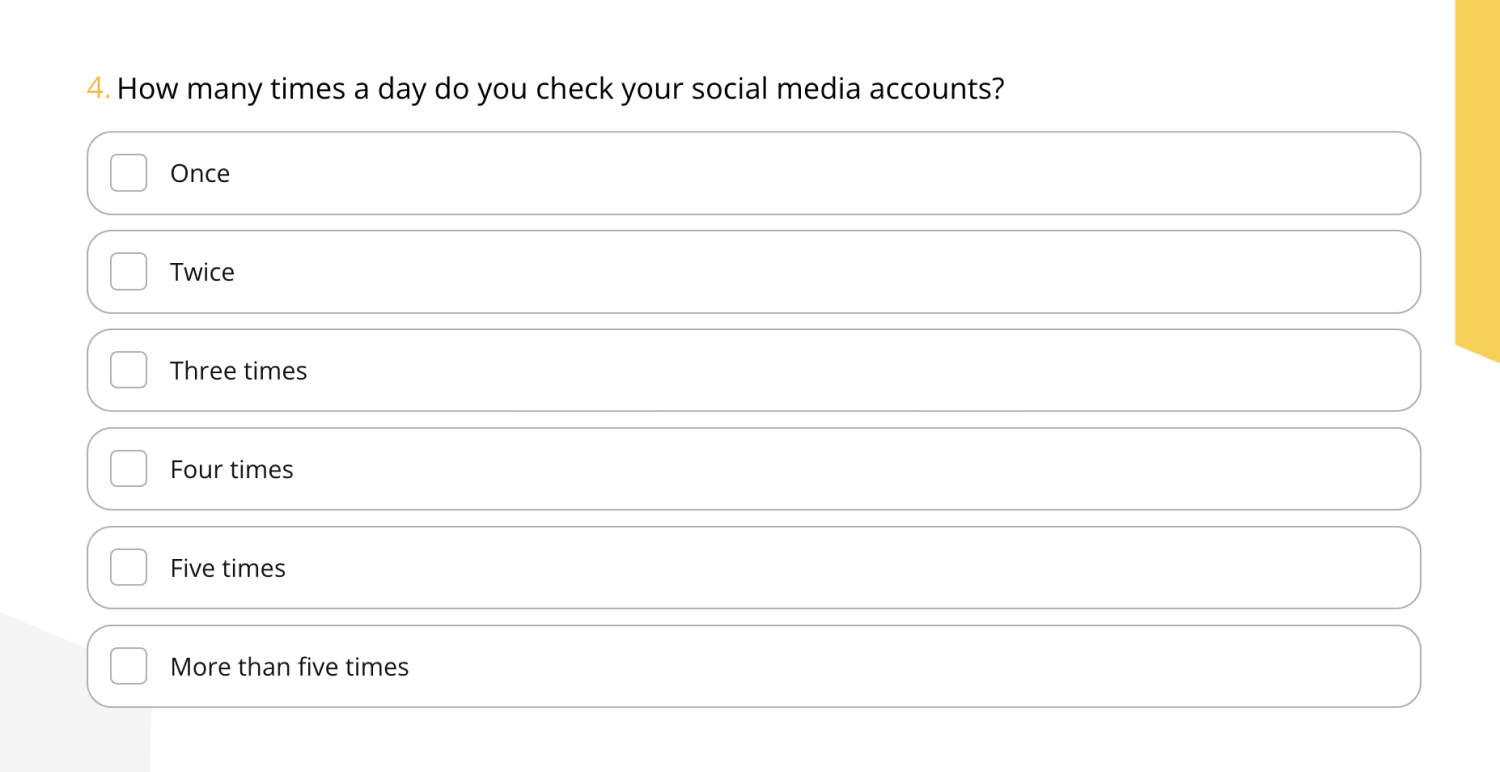
A multiple-choice question example
Selection matrix:
In this type of question, you can make multiple sentences, categories, and statements, and survey takers can answer them accordingly. They allow you to get the answers as one question rather than setting up multiple questions.
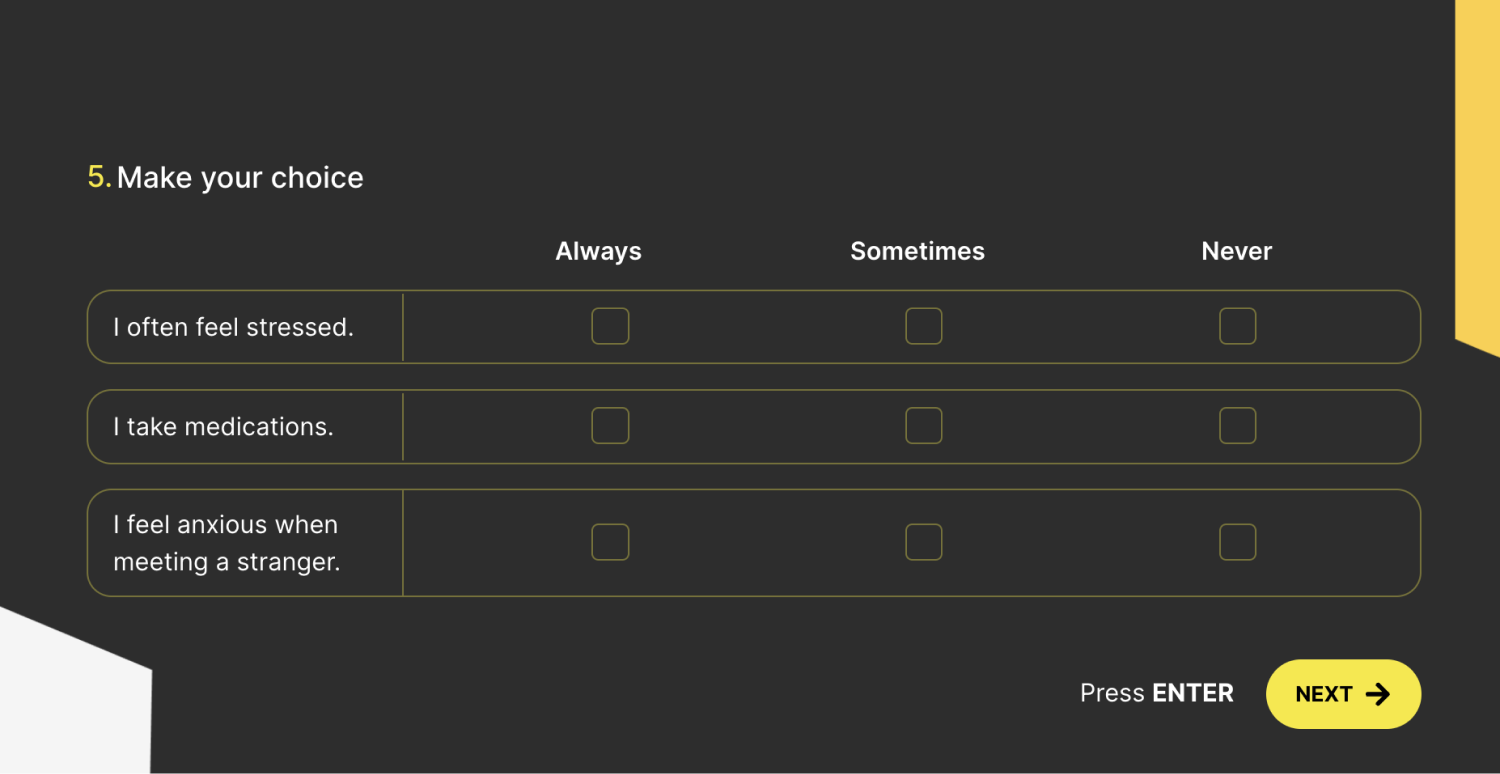
A selection matrix example
100+ Quantitative research questions to ask in your research surveys
In your next survey, you can use any of the questions below, or you can create your own. If you use smart questions focused on a subject or aspect, it will make it easier for you to make an informed analysis at the end. Now, let us start with the first one:
Quantitative research questions about gender
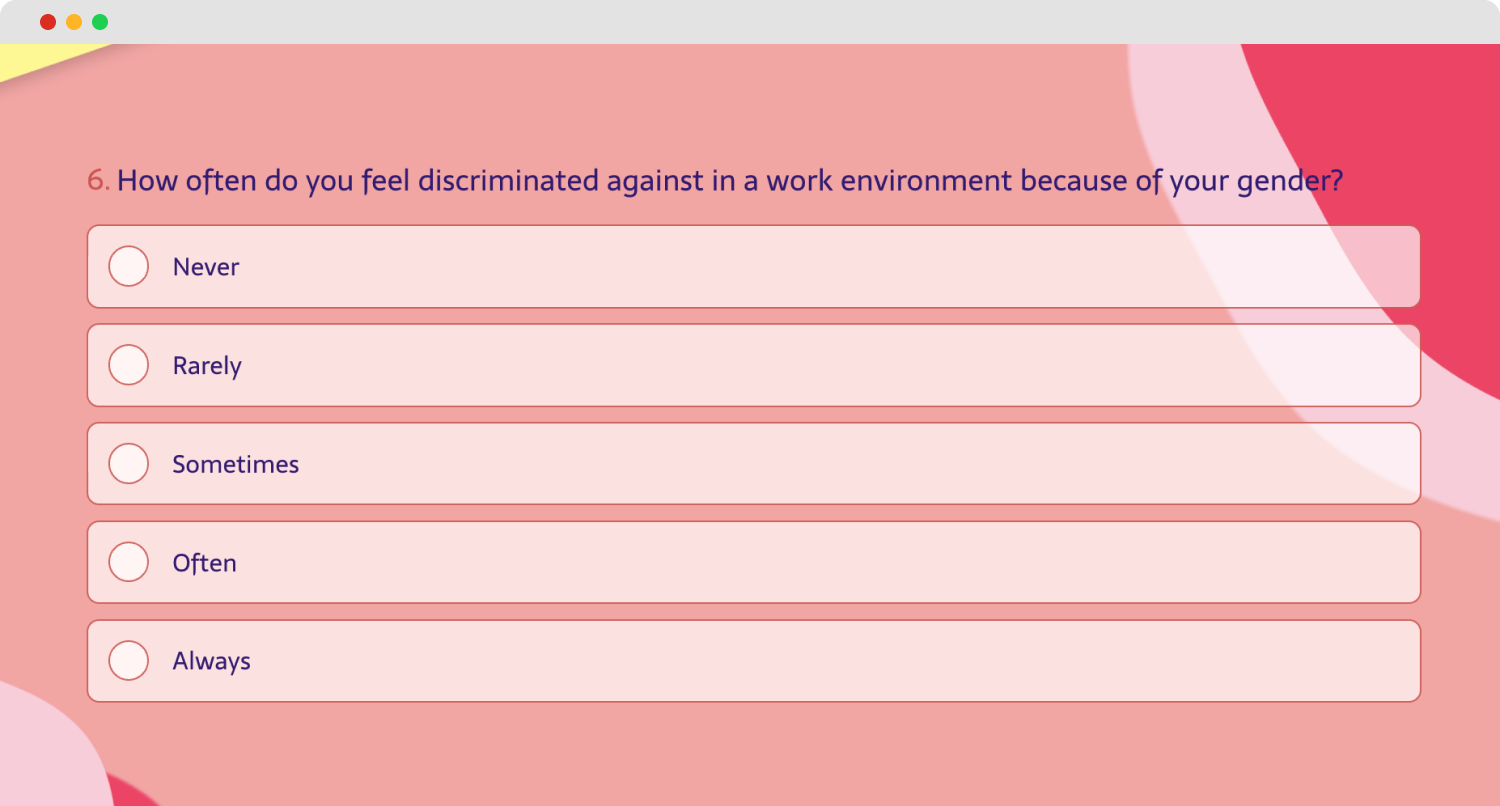
A question example about quantitative research about gender
Quantitative research questions about gender aim to gather numerical data to quantify and analyze gender-related patterns, differences, and associations. They focus on exploring gender-related issues and investigating gender influences on several aspects of life.
1 - What is the difference in average earnings between male and female employees in a specific industry?
2 - How does gender affect academic achievement in STEM subjects among high school students?
3 - What is the percentage of women in leadership positions in Fortune 500 companies?
4 - What is the impact of gender on access to and utilization of health services?
5 - What is the percentage of female students speaking in a classroom as opposed to male students?
6 - How does gender influence consumer preferences and purchasing behavior in the fashion industry?
7 - What are the gender differences in response to specific marketing strategies for a particular product?
8 - What is the correlation between gender and mental health outcomes in a specific population?
9 - How does gender influence the perception of work-life balance among working professionals?
10 - How often do you feel discriminated against in a work environment because of your gender?
11 - What is the effect of gender on smoking at the ages 14-18?
Quantitative research questions about stress
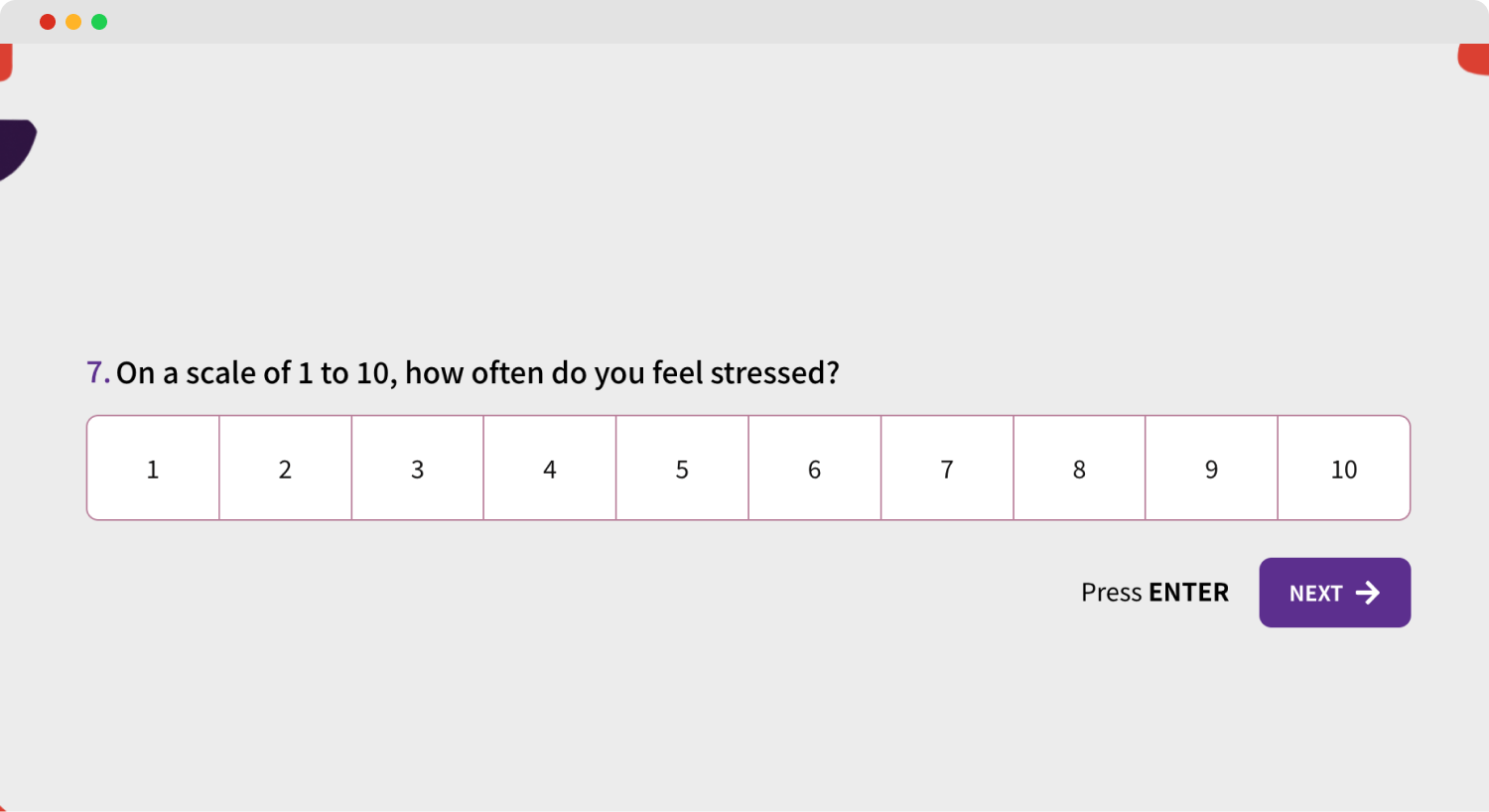
A question example about quantitative research about stress
Research questions about stress aim to investigate different aspects of stress, its causes, and its consequences. Researchers can measure stress levels and examine the relationships between stress and other variables. Also, they can analyze patterns and trends associated with stress after collecting appropriate data.
12 - On a scale of 1 to 10, how often do you feel stressed?
13 - What is the prevalence of stress among college students?
14 - How does stress impact academic achievement among high school students?
15 - How does mindfulness meditation training impact stress levels in university students?
16 - What are the primary sources of work-related stress among employees?
17 - What is the relationship between stress levels and job performance among healthcare professionals?
18 - Who are the people in your life that cause you the most stress?
19 - In the last month, how often have you felt that you were unable to control important things in your life?
20 - How does workplace stress influence employee turnover rates in a specific organization?
21 - What is the correlation between stress levels and physical health in young people?
22 - What are the demographic factors (such as age, gender, or income) associated with higher levels of stress?
23 - What is the impact of stress on sleep quality and duration among adults?
24 - What are the stress levels experienced by parents of children with special needs compared to parents of typically developing children?
25 - What is the effectiveness of stress management interventions in reducing stress levels among individuals with chronic illnesses?
26 - What is the impact of daily meditation helping stress levels?
27 - What are the factors contributing to job-related stress among healthcare professionals in a specific specialty?
Quantitative research questions in Psychology
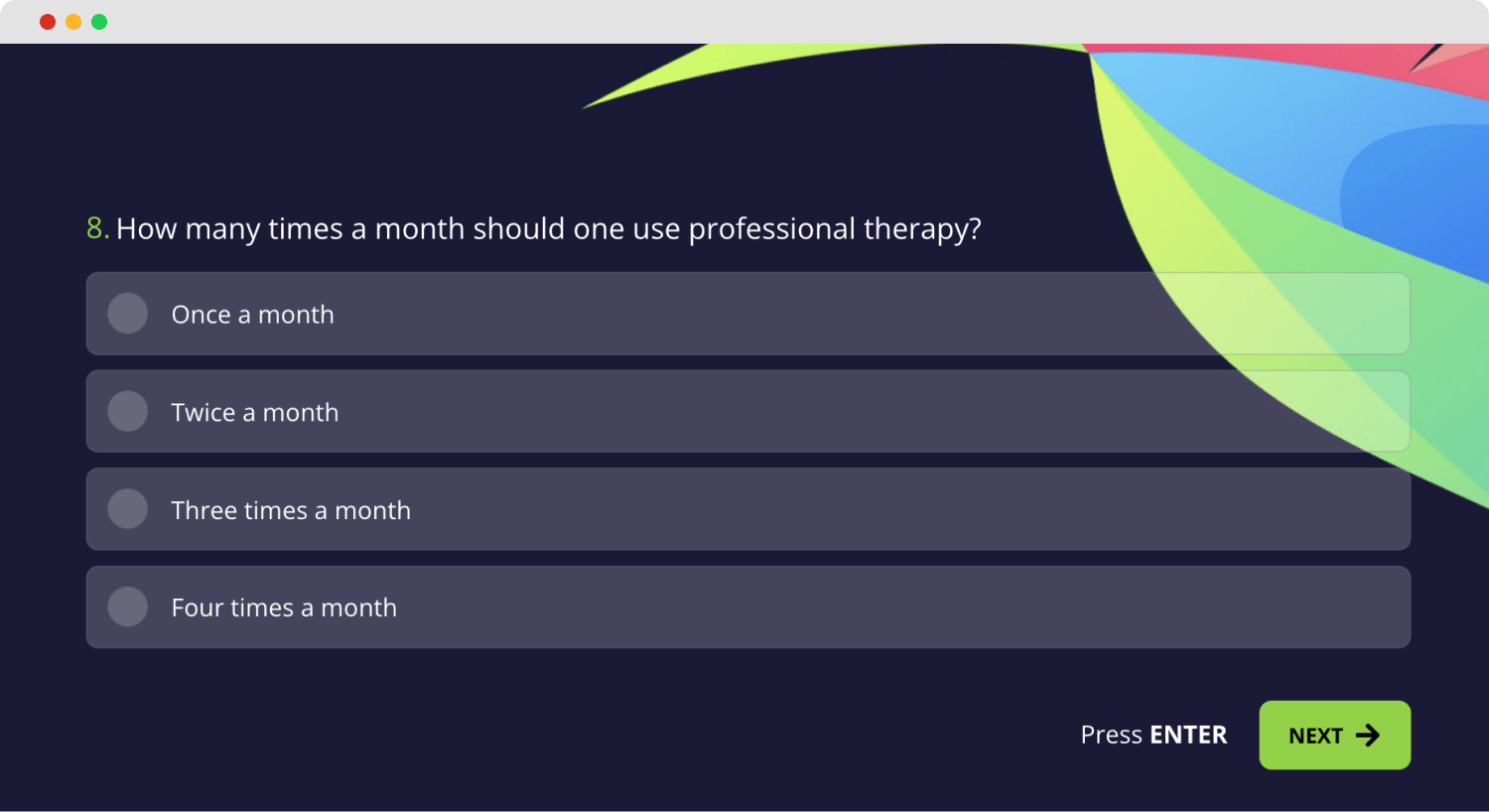
A question example about quantitative research in psychology
Quantitative research questions in psychology cover a range of psychological topics, including mental health, personality, behavior, and social dynamics. The aim of these questions is to collect quantitative data to examine relationships, assess the effectiveness of interventions, and identify factors associated with psychological events.
28 - What is the relationship between self-esteem and academic performance in high school students?
29 - How does exposure to violent media affect aggressive behavior in children?
30 - What is the prevalence of depression among college students?
31 - How is parental attachment style associated with the development of anxiety disorders in children?
32 - How many times a month should one use professional therapy?
33 - What are the factors influencing job satisfaction among employees in a specific industry?
34 - What are the predictors of job performance among healthcare professionals?
35 - Generally, at what age do children start getting psychological help?
36 - What is the effect of cognitive-behavioral therapy on reducing symptoms of post-traumatic stress disorder?
37 - How does the classroom environment affect academic motivation and achievement in elementary school students?
38 - What is the effectiveness of a cognitive training program in improving memory function in older adults?
39 - How do exercise frequency and intensity impact symptoms of anxiety and depression in individuals with diagnosed mental health conditions?
40 - What is the correlation between sleep duration and academic performance in college students?
41 - How does parental divorce during childhood impact the development of attachment styles in adulthood?
42 - What is the relationship between self-esteem and job satisfaction among working professionals?
43 - What are the predictors of eating disorder symptoms in adolescent females?
44 - At what age the teenage girls prone to depression?
45 - What is the correlation between young adults and suicide rates?
46 - What is the effect of a specific cognitive training program on improving cognitive functioning in elders?
47 - How does the presence of social support networks impact resilience levels in individuals who have experienced traumatic events?
48 - What are the effects of a specific therapeutic intervention on reducing symptoms of anxiety in individuals with a generalized anxiety disorder?
49 - What is the correlation between social media use and symptoms of depression in young adults?
50 - How does mindfulness meditation training influence stress levels in individuals with high-stress occupations?
51 - How does exposure to violent video games affect aggressive behavior in adolescents?
Quantitative research questions about mental health
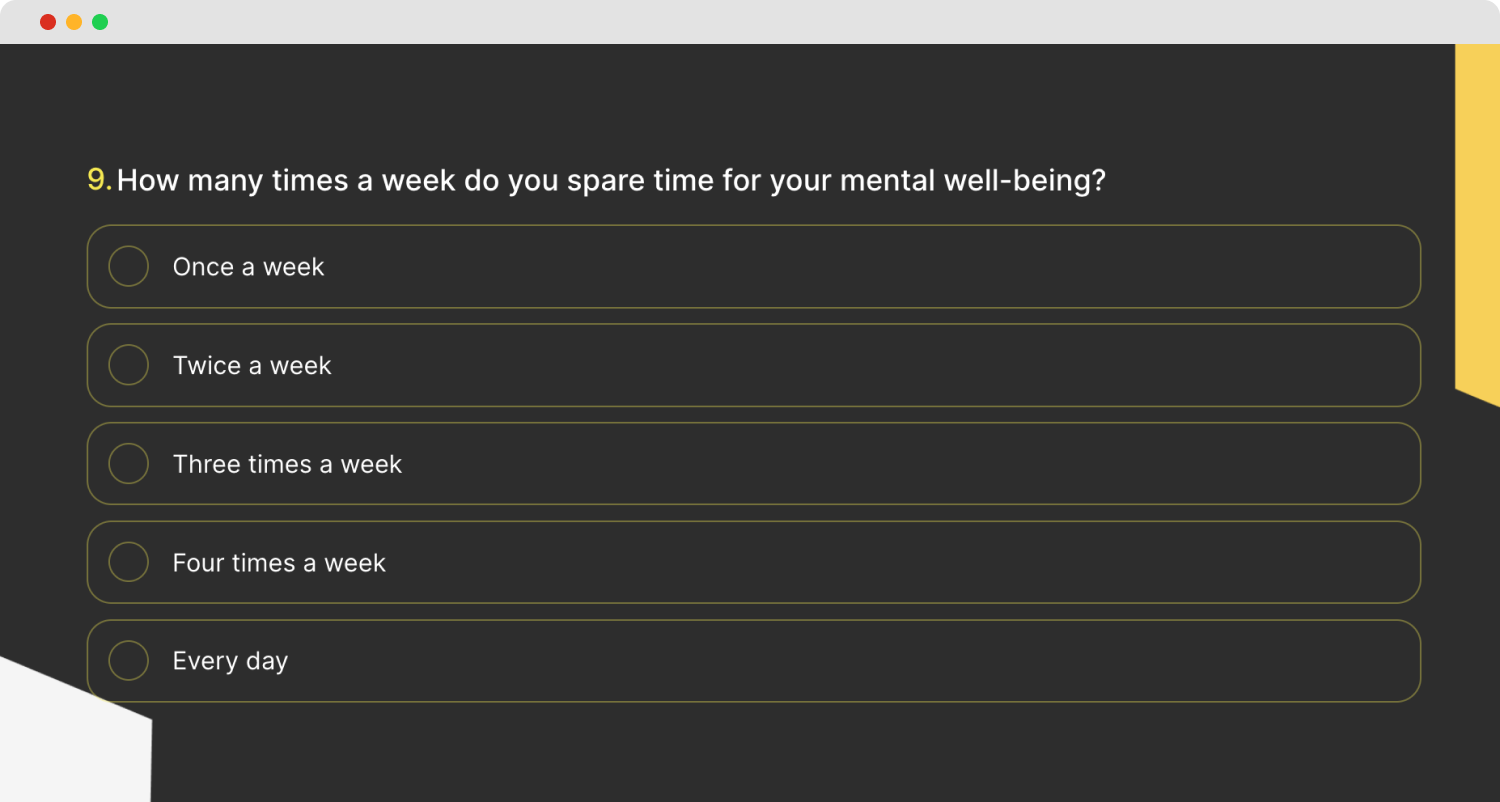
A question example about quantitative research about mental health
Quantitative research questions about mental health focus on various aspects of mental health, including the prevalence of disorders, risk factors, treatment interventions, and the impact of lifestyle factors.
52 - How does the frequency of social media use relate to levels of depressive symptoms in adolescents?
53 - What is the correlation between sleep quality and mental health outcomes in adults with diagnosed mental health conditions?
54 - What is the percentage of people diagnosed with anxiety disorder that has a college education?
55 - What kind of activities helps with your mental health?
56 - How many times a week do you spare time for your mental well-being?
57 - What is the effect of a specific psychotherapy intervention on reducing symptoms of depression?
58 - What are the factors determining treatment adherence in patients with schizophrenia?
59 - How do exercise frequency and intensity relate to anxiety levels?
60 - What is the relationship between social support and endurance in individuals with a history of trauma?
61 - How does stigma surrounding mental illness influence help-seeking behavior among college students?
62 - What is the prevalence of anxiety disorders among college students?
Quantitative research questions about social media
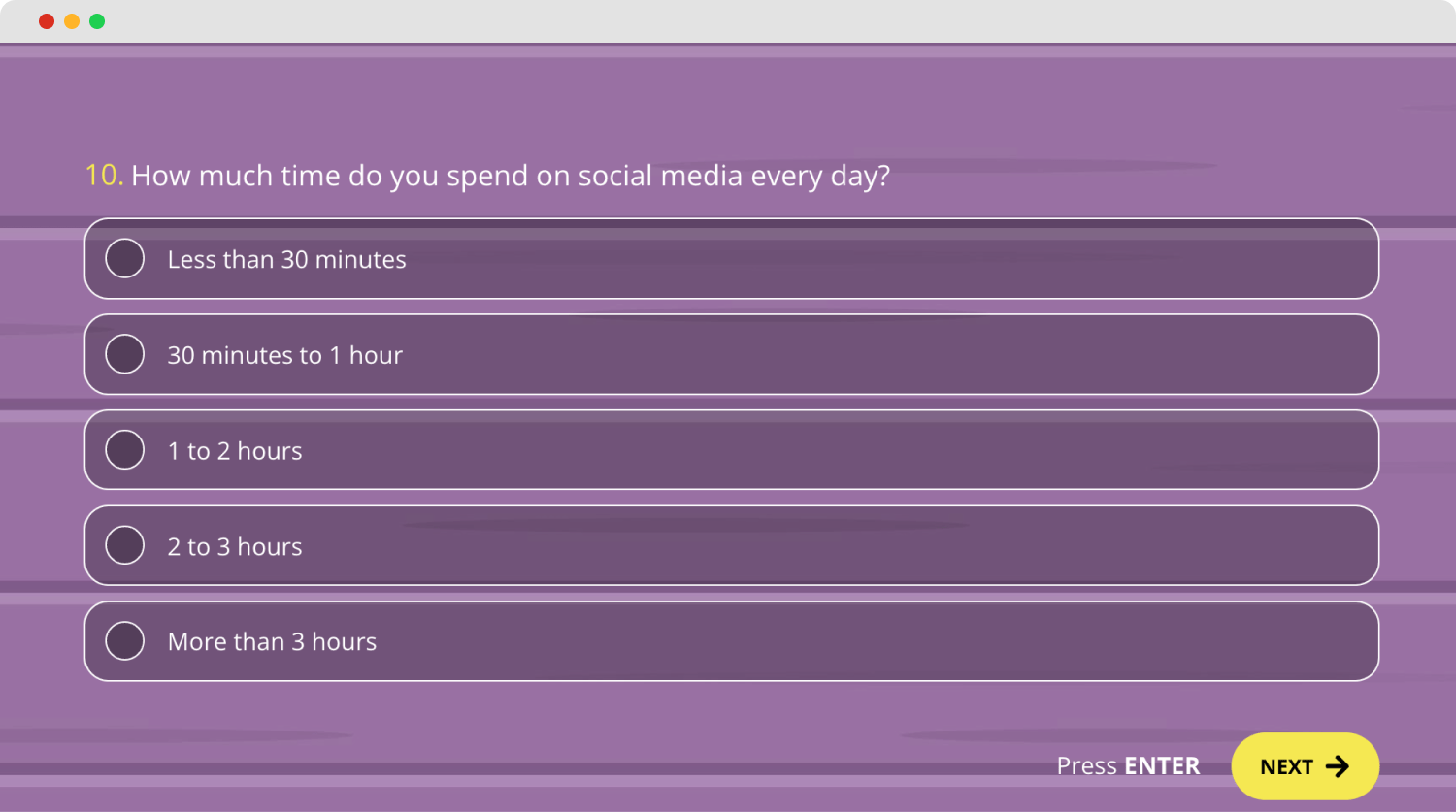
A question example about quantitative research about social media
Quantitative research questions about social media try to explore various aspects of social media, including its impact on psychological well-being, behavior, relationships, and society. They aim to collect quantitative data to analyze relations, examine effects, and measure the influence of social media.
63 - How many times a day do you check your social media accounts?
64 - How much time do you spend on social media every day?
65 - How many social media accounts do you own?
66 - What is the correlation between social media engagement and academic performance in high school students?
67 - What are the most used social media accounts among teenagers?
68 - What is the psychological effect of social media accounts on young people?
69 - What is the relationship between social media use and self-esteem among adolescents?
70 - How does the frequency of social media use relate to levels of loneliness in young adults?
71 - How does exposure to idealized body images on social media impact body dissatisfaction in women?
72 - What are the predictors of problematic social media use among college students?
73 - How does social media use influence political attitudes and behaviors among young adults?
74 - What is the effect of social media advertising on consumer purchasing behavior and brand loyalty?
75 - What is the association between cyberbullying on social media and mental health outcomes among teenagers?
76 - How does social media use affect sleep quality and duration in adults?
77 - How does social media use impact interpersonal relationships and social support among individuals in long-distance relationships?
Quantitative research questions about academic performance

A question example about quantitative research about academic performance
Quantitative research questions about academic performance focus on academic performance, the predictors, and the elements affecting it negatively and positively. They aim to collect quantitative data to figure out the relation between academic performance and the environment of the students and make informed decisions.
78 - What is the correlation between student attendance rates and academic achievement in a specific grade level?
79 - How does parental involvement in education relate to students' academic performance?
80 - What is the impact of classroom size on student academic outcomes?
81 - What are the predictors of academic success among undergraduate students in a specific major?
82 - How many times were you absent during the last semester?
83 - What is the correlation between student engagement in extracurricular activities and their academic performance?
84 - What is the effect of peer tutoring programs on student grades and test scores?
85 - How do student motivation and self-efficacy influence academic achievement in a specific academic setting?
86 - What is the relationship between study habits and academic performance among high school students?
87 - How does the implementation of a specific teaching methodology or instructional approach impact student achievement in a particular subject?
Quantitative research questions about marketing
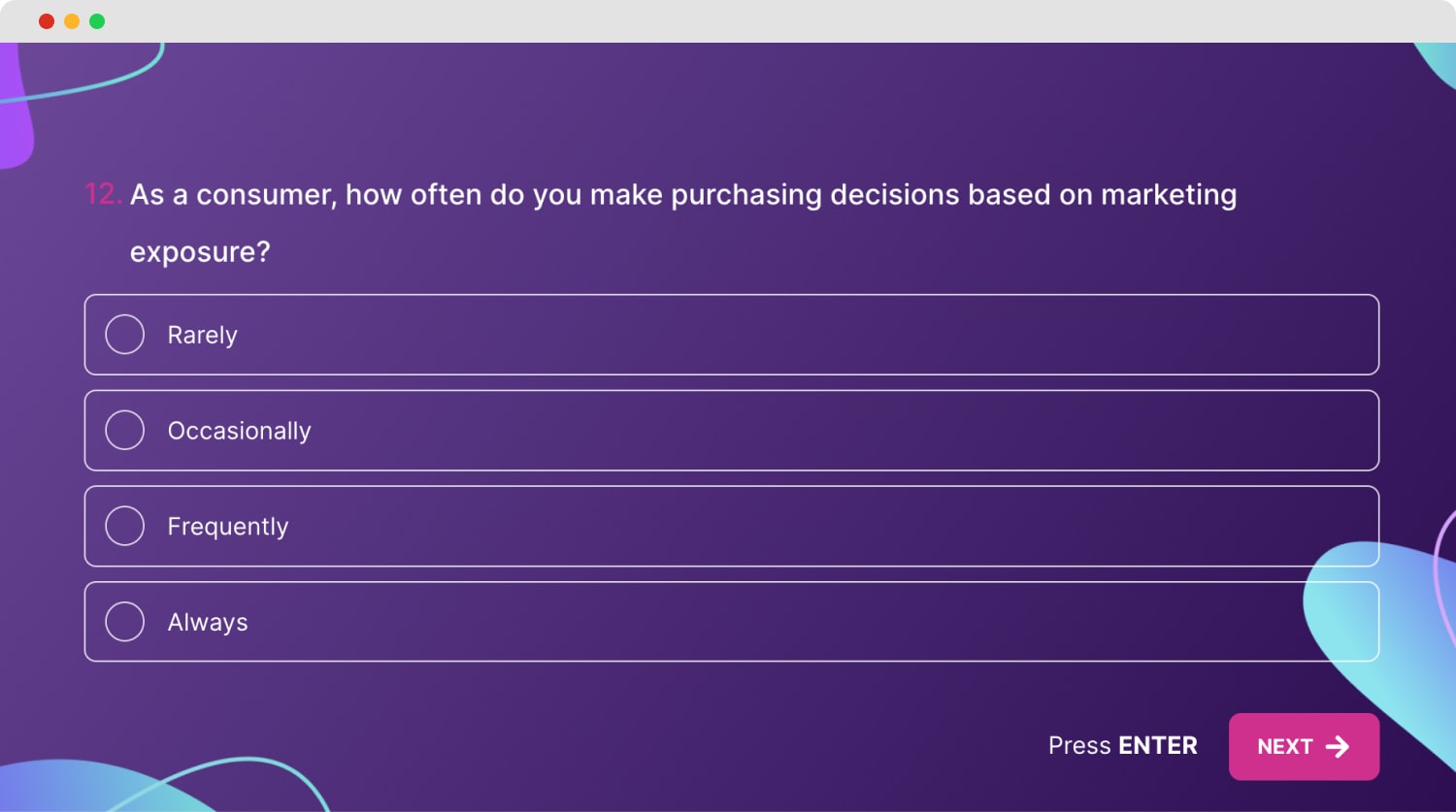
A question example about quantitative research about marketing
Quantitative research questions about marketing explore various aspects of marketing, including advertising effectiveness, consumer behavior, branding, pricing, and customer satisfaction. They involve collecting quantitative data to analyze relationships and assess the impact of marketing strategies.
88 - What is the correlation between advertising expenditure and sales revenue for a specific product?
89 - As a consumer, how often do you make purchasing decisions based on marketing exposure?
90 - What are the top 5 brands that stand out to you because of ads of their quality?
91 - How does brand loyalty relate to customer satisfaction and repeat purchase behavior?
92 - What is the impact of pricing strategies on consumer purchase intentions and price sensitivity?
93 - When making a purchase, how important is the packaging of the product to you?
94 - What is the effectiveness of different marketing channels (e.g., social media, television, email marketing) in reaching and engaging the target audience?
95 - How does product packaging design influence consumer perception and purchase decisions?
96 - What are the key factors influencing customer loyalty in the retail industry?
97 - What is the relationship between online customer reviews and purchase decisions in e-commerce?
98 - How do brand reputation and perception affect consumer trust and willingness to recommend a product or service?
99 - What are the channels you visit to ensure the quality of the product you will purchase?
100 - How does the personalization of marketing messages impact customer engagement and response rates?
101 - What is the effect of promotional offers (e.g., discounts, coupons) on consumer purchase behavior?
102 - What is the effect of ad placement on popular social media accounts on teenagers?
Tips for creating quantitative research questions
When you want to create your survey, you should be professional and collect the data systematically. That will help you have clear results. In order to achieve this:
- Use clear and unambiguous language
- Avoid leading or biased questions
- Use different question types
- Keep the length of your survey at an appropriate level
After you create your survey in a systematic manner and use a competitive analysis framework to record your findings, you can achieve the concrete results you want. Also, always remember to obtain the necessary ethical approvals and informed consent required for your research study.
How to create a quantitative research survey
When you are creating your next survey, you can go old-fashion and write everything down on a piece of paper and try to get people to fill them out. However, there is a much easier option thanks to online survey tools. And a great survey maker you can use is forms.app. It has over 1000 ready-to-use templates, and each of them is as useful. Now, let us go through the steps to creating a quantitative survey using forms.app:
1 - Go to forms.app and log in to your account (or create one for free).
2 - Go to the dropdown menu and click on the templates option.
3 - Choose one of the survey templates and click on the “use template” button and customize it as much as you want by adding question fields and changing the visuals as much as you want.
4 - Or, you can decide on starting from scratch and build everything from the start in a matter of minutes.
5 - Save your changes, and by clicking on the “eye” icon on the upper left side of the page, see the final result.
6 - Copy the unique link and share it with your audience. If you want, you can also embed the survey on the page of your choosing.
Key points to take away
Creating a simple survey to collect numerical values to make informed and supported plans is very easy. It can be done with a simple and effective form creator, such as forms.app. It has many functional form fields and is also completely adjustable.
You can easily create your own research survey with the questions we have gathered for you. It should be mentioned that you should keep in mind to have a structured plan to go with. Because only then can you analyze your results effectively and repeat the research if it is needed.
Defne is a content writer at forms.app. She is also a translator specializing in literary translation. Defne loves reading, writing, and translating professionally and as a hobby. Her expertise lies in survey research, research methodologies, content writing, and translation.
- What is a quantitative research question?
- How to write a quantitative research question
- Types of quantitative questions
- 100+ Quantitative research questions to ask in your research surveys
- Tips for creating quantitative research questions
- How to create a quantitative research survey
- Key points to take away



